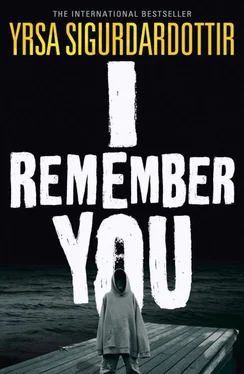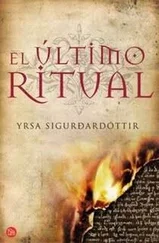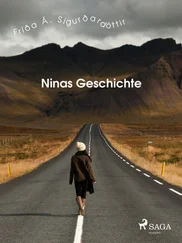‘We don’t need to go any further if it’s killing you.’ Katrín grimaced as Garðar pulled down his sock to reveal a blood-red blister. He winced when the curious Putti sniffed at the wound. Katrín tried to remember whether they’d packed bandages or analgesic sprays from the car, but could only recall having planned to take such things with her, not actually having done so. ‘Your foot looks awful.’
‘It’ll be all right tomorrow. I have other shoes that don’t come so high up the ankle.’ Garðar pulled his sock all the way down to the middle of his instep as he rested his foot on top of his shoe. ‘It was stupid of me not to have worn them now.’
‘That’s absolutely disgusting.’ Líf made a face, but then smiled. ‘I think amputation is the only cure. It’s a tragedy.’
Garðar didn’t seem amused, though he tried to force a smile. He was going to reply but Katrín beat him to it. ‘Just wait here. Líf and I will head over there and have a look at it. You can rest your leg in the meantime and we’ll take our time coming back.’
Garðar couldn’t hide his relief at a chance to sit down. ‘Good idea. I doubt I’d make it back if I took one more step.’ He plonked himself down on a grassy bank that appeared specially designed to allow people to rest their weary bones. ‘It wouldn’t hurt to cool down my heel a bit.’ He stretched out his leg to allow the wind to soothe his half-bare foot, and it was as if the wind took this as a cue to blow colder.
‘I’m going to wait here too.’ Líf sat down by his side. ‘I’ve actually had enough walking to last me a lifetime.’ She let herself fall backwards and lay staring up at the sky. ‘Don’t be too long.’
On her way up the hollow Katrín had to keep pushing her hair out of her face, since the wind seemed to be trying its best to blow it constantly into her eyes. She automatically stuck her hand into her pocket to see if she had a hair-band before remembering that of course she hadn’t brought any. As a result, she could see little or nothing and couldn’t get a good idea of the area until she’d nearly reached her destination. She stopped, turned back and shouted to Garðar and Líf: ‘It’s a cemetery. Maybe the crosses are from here.’ She wasn’t certain whether they’d heard her over the breeze, but Garðar waved at her. Instead of shouting louder she walked all the way up to a level area containing several rather elegant but weatherworn graves. She could tell them about this on the way back to the house. The man-made structure that had caught Katrín’s attention, a memorial made of stacked-up stones, was located in the centre of the area. Not many people had lived and died around here, judging by the number of graves, which seemed to be only several dozen. Most of them looked as if winter had repeatedly been allowed to run roughshod over them; by the skipper’s account, no one visited the area from the end of August until the spring. It was likely that some of the graves had never been tended. Many of the dead had lost their offspring to the south or to distant places, and then there were those who had lived and died alone. It was clear, at least, that in some places the brush had been allowed to grow undisturbed, and it now lay withered and dry among the graves. Weathered crosses and crooked headstones were the only indication that the previous residents of the village were resting there. Katrín knew she was starting to let her imagination run away with her, but she thought the vegetation looked even more lifeless here than elsewhere in the area, and the stalks and dried-out plants appeared to snap more loudly beneath her feet. The wind also felt colder and seemed to carry a whisper that her ears couldn’t quite make out. She suddenly felt chillier, as though she would never warm up again. After zipping her jacket all the way up she felt slightly better, even if she still wasn’t warm. She took several steps to a fenced-off plot with an impressive iron cross that had broken and now stood with its head tilted. The fence around the area must have been unusually elegant in its time, but its delicate ironwork was now just as rusted as the cross. The effect was tragic.
She turned abruptly to see whether Garðar and Líf were still where she’d left them. They were, of course, and seemed to be in intense discussion. She suddenly longed to turn around and run back to them; let the cemetery wait until they returned with her to have a look at it. But she knew she would be annoyed at herself as soon as she went back down the path if she didn’t investigate whether the crosses were from the cemetery, so she turned and walked quickly over to the first grave. On it was an impressive headstone with the names of a couple who had died in 1949. Neither the date nor the names matched those on the crosses, which Katrín recalled were ‘Hugi’ and ‘Bergdís’, and although she wasn’t entirely certain, she thought that both had died in 1951. She was quite surprised that she should remember this, since she was usually particularly bad with dates and numbers. She turned to the next grave, but the inscription on its headstone was so faded that there was no way of telling what was on it. The same went for the next two headstones. As she stood and wondered whether she should check all the graves, Katrín noticed that a panel of text was affixed to the memorial.
She walked up to the modest but attractive pile of stones. On top of it stood a cross and within a hollow space on its front was a handsome bell, as well as the panel containing the text that Katrín had noticed. When she got closer she was pleased to see that it was a map showing the position of the graves, along with a list of the names of those resting in the cemetery. Also on it was a black and white picture of a little church, with general information stating that a church had stood just inside the village; it had been built in 1899 and was a gift from the Norwegian M.C. Bull, who ran the whaling station Hekla in Stekkseyri. A chapel had served the settlement for several centuries before the church was built. The church had been moved to Súðavík in 1960, but the text explained that the bell in the memorial was from the church, and had been cast in 1691. Katrín found that interesting, particularly given that it hung there unprotected, accessible to everyone. The summary ended with some exceptionally brief information about Hesteyri, considering how many people had lived their lives there, experiencing all the pain, tribulations and joyous moments that fate would have dealt them. Perhaps history didn’t offer any detailed information, so the marker made do with stating that Hesteyri had become a certified commercial town in 1881; around 420 people had resided there permanently at the settlement’s height; it had had a telegram station, then later a telephone exchange, as well as a physician. Concerning the end of the settlement, all that was stated was that around 1940 its population had started to dwindle and the last residents moved away in 1952.
There was more information to be gleaned from the list of names. Two groups were described: those who were known to have been buried there but whose exact location was unknown, and those who rested in marked graves. The unidentified graves were mostly from the turn of the century, 1900. Katrín found herself thinking that at that time the residents hadn’t had the resources or reason to put up hard-wearing markers and the graves had therefore vanished into oblivion when weather and vegetation levelled the mounds or other signs of them. The known graves were more recent, the majority of them dating from the 1920s. It surprised Katrín that the newest graves in the cemetery were made in 1989; there were also three individuals buried here whose nationality was the only information still readable: two Norwegians and one German. It was a sad fate to be buried in a distant land that over time forgot a man’s name, his date of birth, and even date of death, which at least must have been known.
Читать дальше










